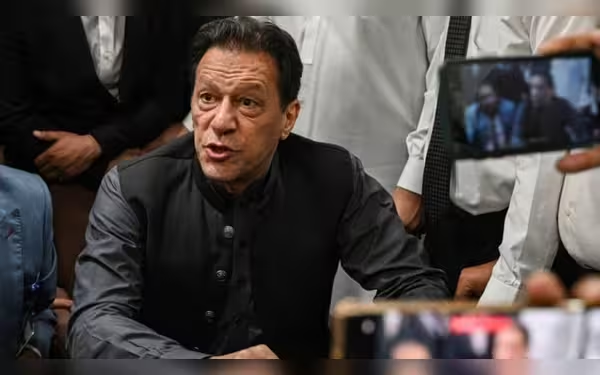Sunday, November 24, 2024 09:40 PM
Imran Khan Under Investigation for September 28 Protest Violence
- Imran Khan faces police interrogation over protest violence.
- Evidence includes social media posts and surveillance footage.
- Khan accused of inciting unlawful protests in Rawalpindi.
 Image Credits: geo
Image Credits: geoImran Khan faces intense police questioning regarding his alleged role in inciting violence during the September 28 protest in Rawalpindi.
On November 24, 2024, the political landscape in Pakistan took another dramatic turn as Imran Khan, the founding chairman of the Pakistan Tehreek-e-Insaf (PTI), faced intense questioning from the Rawalpindi police. This interrogation is part of an ongoing investigation into a violent protest that occurred on September 28, which has raised significant concerns regarding public safety and law enforcement in the region.
The police have labeled this session as the 'second phase of interrogation' following Khan's arrest in connection with the case filed at the New Town police station. The authorities allege that Khan played a pivotal role in inciting violence during the protest, which has led to a series of legal actions against him and his party members.
During the interrogation, which took place in Adiala jail, a team of police officials, including Superintendent Police (SP) Rawal Raja Haseeb and Deputy Superintendent of Police (DSP) Legal Raja Inayat, posed over 15 questions to the former prime minister. These questions were meticulously crafted based on the testimonies of 23 suspects already in police custody. This thorough approach indicates the seriousness with which the police are treating the case.
Moreover, the investigative team has gathered substantial evidence, including social media posts and speeches made by PTI leaders, as well as records of individuals who visited Khan in prison. Surveillance footage relevant to the case has also been obtained, which could prove crucial in establishing the timeline and actions taken during the protest.
According to reports, the questionnaire presented to Khan suggests that he called for action on the day of the protest, which allegedly resulted in violent demonstrations in Rawalpindi. The police claim that local PTI leaders, including Seemabia Tahir, organized these protests under Khan's directives. He is accused of inciting party workers to engage in unlawful protests, violating Section 144, which prohibits gatherings in certain circumstances.
The interrogation lasted approximately one hour, after which the investigation team left. Notably, Khan's cell in Adiala jail has been designated as a temporary extension of the New Town police station, with security managed by the Rawalpindi police. Khan was arrested in connection with this case on the night of November 20-21, and a Special Anti-Terrorism Court subsequently granted the police a five-day physical remand for further questioning.
This ongoing situation highlights the complexities of political dissent in Pakistan and raises questions about the balance between maintaining public order and upholding democratic rights. As the investigation unfolds, it remains to be seen how these developments will impact the political future of Imran Khan and the PTI, as well as the broader implications for civil liberties in the country.













